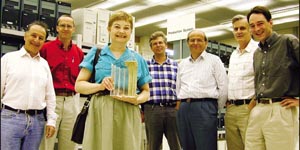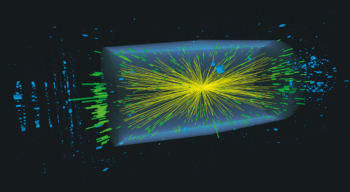On 4 June in Washington’s National Building Museum, Les Robertson, deputy leader of CERN ‘s information technology division, accepted a 21st-century Achievement award from the Computerworld Honors Program, on behalf of the laboratory.

This prestigious award was made to CERN for its innovative application of information technology to the benefit of society, and it followed the laboratory’s nomination by Lawrence Ellison, chairman and CEO of the Oracle Corporation. Ellison nominated CERN in the science category in recognition of “pioneering work in developing a large-scale data warehouse” – an innovative computing architecture that responds precisely to the global particle physics community’s needs.
The kind of computing needed to analyse particle physics data is known as high-throughput computing – a field in which CERN has played a pioneering role for over a decade. In the early 1990s a collaboration of computer scientists from the laboratory, led by Les Robertson, and physicists from many of CERN’s member states developed a computing architecture called SHIFT, which allowed multiple tape, disc and CPU servers to interact over high-performance network protocols. SHIFT’s modular design simultaneously allowed scalability and easy adoption of new technologies.
Over the years, CERN has proved these features by evolving SHIFT from the systems of the 1990s, based on RISC (reduced instruction set computer) workstations and specialized networks, to today’s massive systems. These include thousands of Linux PC nodes linked by gigabit Ethernet to hundreds of Terabytes of automated tape storage cached by dozens of Terabytes of caches based on commodity disk components.
CERN has since worked on evolving SHIFT in collaboration with physicists and engineers from universities and laboratories around the world. Several collaborations with industrial partners have been formed as successive technologies were integrated into the system. Today, SHIFT is in daily use by the many physics experiments that use CERN’s facilities, providing a computing service for more than 7000 researchers worldwide.
For the future, CERN and other particle physics institutes are working on scaling up this innovative architecture to handle tens of thousands of nodes, and incorporating computational grid technology to link the CERN environment with other computing facilities, easing access to the colossal quantities of data that will be produced by experiments at the laboratory’s forthcoming particle accelerator, the Large Hadron Collider, which will switch on in 2006.
Welcoming the award, CERN director-general, Luciano Maiani said: “This is an important recognition of CERN’s excellence in information technology. In particular, it is a reward for the teams of physicists on CERN’s LEP experiments who contributed to the development and implementation of this new architecture. The prize is also an encouragement for the physicists working on the complex challenges of LHC computing.”
Hans Hoffmann, CERN’s director of scientific computing, commented: “In addition to its major contribution to physics, CERN has been a consistent innovator in information technology, from the Web to its current work on grid computing. We are delighted with this prize; particularly as it demonstrates recognition for CERN’s computing initiatives, not from the academic world but from industry’s leading computing experts.”
Also among the winners this year was Tim Berners-Lee, who received the Cap Gemini Ernst & Young Leadership award for Global Integration in recognition of his pioneering work on the World Wide Web – work carried out while he was at CERN in the early 1990s.
* More information on the Computerworld Honors Programme is available at “http://www.cwheroes.org”.





